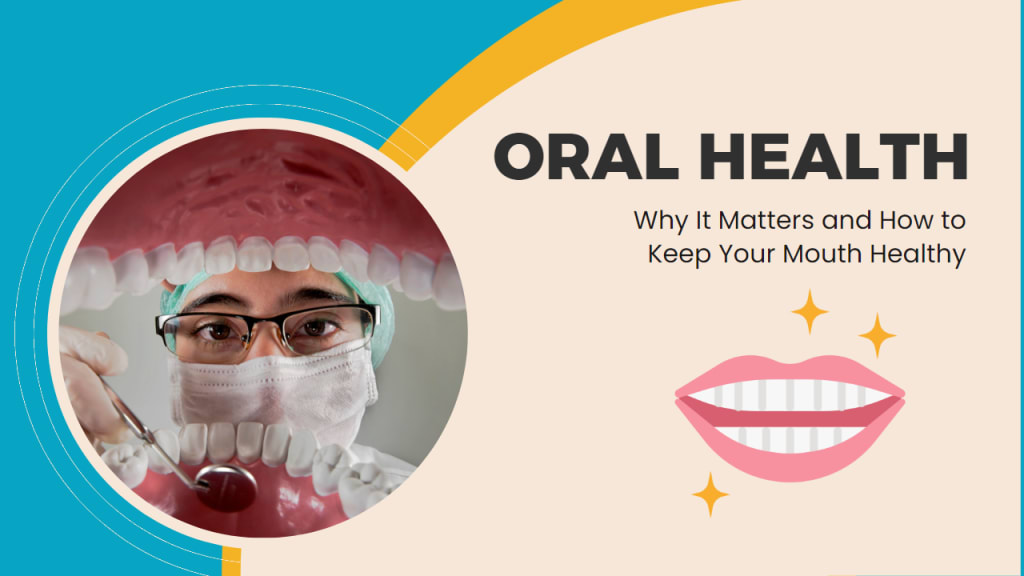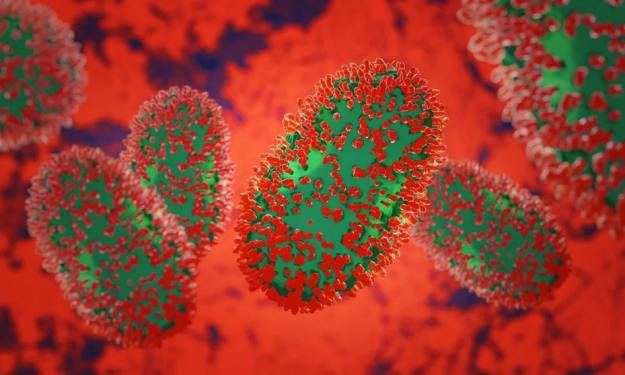Oral Health
Why It Matters and How to Keep Your Mouth Healthy

Oral health is often overlooked, but it is essential for overall health and well-being. Poor oral health can lead to a variety of problems, including tooth decay, gum disease, and even heart disease. In this article, we will discuss the importance of oral health, how to maintain good oral hygiene and common dental problems.
Importance of Oral Health
Oral health is not just about having a bright smile. It is essential for overall health. Poor oral hygiene can lead to various health problems, including:
Tooth Decay: Tooth decay is a common dental problem that affects both children and adults. It occurs when bacteria in the mouth produce acid that erodes the tooth's enamel, leading to cavities.
Gum Disease: Gum disease is a common dental problem that affects the gums and bones supporting the teeth. It occurs when plaque builds up on the teeth, leading to inflammation and infection.
Bad Breath: Bad breath, or halitosis, is a common problem that affects many people. It can be caused by poor oral hygiene, food, tobacco, or other medical conditions.
Mouth Sores: Mouth sores are common and can be caused by a range of factors, including infections, injuries, and certain medical conditions.
Heart disease: Recent studies have found a link between gum disease and heart disease.
Diabetes: People with diabetes are more susceptible to gum disease, which can make it harder to control blood sugar levels.
Therefore, taking care of your oral health is essential for your overall health.
Maintaining Good Oral Hygiene
Maintaining good oral hygiene is crucial to prevent dental problems. Here are some tips for maintaining good oral hygiene:
Brushing: Brush your teeth at least twice a day with fluoride toothpaste. Use a soft-bristled toothbrush and replace it every three months. Brush in a circular motion and do not forget to brush your tongue.
Flossing: Floss at least once a day to remove plaque and food particles between your teeth. Use about 18 inches of floss and wrap it around your middle fingers. Hold the floss tightly and gently insert it between your teeth. Move the floss back and forth and up and down.
Mouthwash: Mouthwash can help reduce the number of bacteria in your mouth. Rinse with mouthwash after brushing and flossing.
Tongue Cleaning: Cleaning your tongue with a tongue scraper or a soft-bristled toothbrush can help remove bacteria and prevent bad breath.
Maintaining Good Oral Health
Maintaining good oral health involves a combination of healthy habits, including:
Healthy Diet: A healthy diet is essential for good oral health. Avoid sugary and acidic foods and drinks that can damage your teeth. Instead, eat foods that are rich in vitamins and minerals, such as fruits, vegetables, and dairy products.
Limit Sugary Foods and Drinks: Limiting sugary foods and drinks is an essential part of maintaining good oral health. When sugar is consumed, it reacts with bacteria in the mouth to form acid. This acid attacks the enamel, the protective layer of the tooth, and can lead to decay and cavities.
To reduce the amount of sugar in your diet, try to avoid sugary drinks such as soda, sports drinks, and energy drinks. Instead, opt for water or unsweetened beverages. When it comes to food, choose healthier options such as fresh fruits and vegetables, whole grains, and lean proteins.
Avoid Smoking: Smoking is harmful to oral health and can lead to a range of dental problems, including gum disease, tooth decay, and oral cancer.
Regular Dental Check-Ups: Regular dental check-ups are essential for maintaining good oral health. Dental professionals can detect dental problems early and provide appropriate treatment.
Common Dental Problems
Despite good oral hygiene habits, dental problems can still occur. Here are some common dental problems:
Tooth Decay: Tooth decay occurs when bacteria in your mouth produce acids that damage your tooth enamel. Symptoms of tooth decay include tooth sensitivity, toothache, and visible holes in your teeth.
Gum Disease: Gum disease occurs when plaque builds up on your teeth and gums, causing inflammation and even tooth loss. Symptoms of gum disease include red, swollen, and bleeding gums.
Tooth Sensitivity: Tooth sensitivity occurs when the enamel on your teeth wears down, exposing the sensitive layer underneath. Symptoms of tooth sensitivity include pain or discomfort when eating or drinking hot or cold foods.
Oral Cancer: Oral cancer can affect your lips, tongue, mouth, and throat. Symptoms of oral cancer include mouth sores, white or red patches in your mouth, and difficulty swallowing or speaking.
Solutions For All Dental Problems
ProDentim is a revolutionary dental product that comes in the form of a melting probiotic candy. It targets the mouth flora or "the microbiome" and is designed to repopulate your mouth with good bacteria, promoting overall oral health. In addition to dental health, ProDentim also addresses respiratory tract and allergies, digestive problems, and weight loss. With a unique blend of 3.5 billion probiotics and nutrients, every ProDentim candy contains ingredients that support the health of your gums and teeth. Try ProDentim today and experience the ProDentim difference - it's unlike anything you've ever tried before!
Conclusion
In conclusion, oral health is crucial for your overall health and well-being. Maintaining good oral hygiene habits, such as brushing, flossing, and regular dental visits, can help prevent dental problems and improve your overall health. So, make sure to take care of your mouth and teeth for a healthier and happier life. If you experience any dental problems, such as tooth decay or gum disease, it is essential to see a dentist as soon as possible.
FAQs
Q. How often should I brush my teeth?
A. It is recommended to brush your teeth at least twice a day, ideally in the morning and before bed.
Q. Should I use an electric or manual toothbrush?
A. Both electric and manual toothbrushes can effectively clean your teeth. However, electric toothbrushes may be more effective at removing plaque and reducing the risk of gum disease.
Q. Is flossing really necessary?
A. Yes, flossing is an essential part of maintaining good oral hygiene. It helps remove plaque and food particles between your teeth, where your toothbrush cannot reach.
Q. How often should I see a dentist?
A. It is recommended to see a dentist at least twice a year for regular checkups and cleanings. However, if you have any dental problems, you may need to see a dentist more frequently.
Q. Can poor oral hygiene lead to other health problems?
A. Yes, poor oral hygiene has been linked to various health problems, including heart disease, diabetes, and even dementia.
Q. How often should I replace my toothbrush?
A. It is recommended to replace your toothbrush every three to four months, or sooner if the bristles become frayed or worn. This is important to ensure that your toothbrush is effectively cleaning your teeth.
Q. Can certain foods or drinks affect my oral health?
A. Yes, sugary and acidic foods and drinks can contribute to tooth decay and erosion. It is important to limit your intake of these types of foods and drinks and to practice good oral hygiene habits.
Q. Are there any natural remedies for improving oral health?
A. While there is no substitute for good oral hygiene habits and regular dental visits, some natural remedies may help improve oral health. These include oil pulling, using certain essential oils, and consuming probiotics.
Q. How can I prevent bad breath?
A. Practicing good oral hygiene habits, such as brushing and flossing regularly, can help prevent bad breath. Additionally, avoiding foods and drinks that can contribute to bad breath, such as garlic and coffee, and staying hydrated can also help.
Q. What should I do if I experience a dental emergency?
A. If you experience a dental emergency, such as a knocked-out tooth or severe tooth pain, it is important to seek immediate dental care. Contact your dentist or dental emergency service for assistance.
About the Creator
MANOJ KUMAR
Never Stop Dreaming: A true inspiration for anyone looking to turn their dreams into reality. From a humble background to a millionaire, my journey is a testament to the power of hard work, dedication, and an unbreakable spirit






Comments
There are no comments for this story
Be the first to respond and start the conversation.